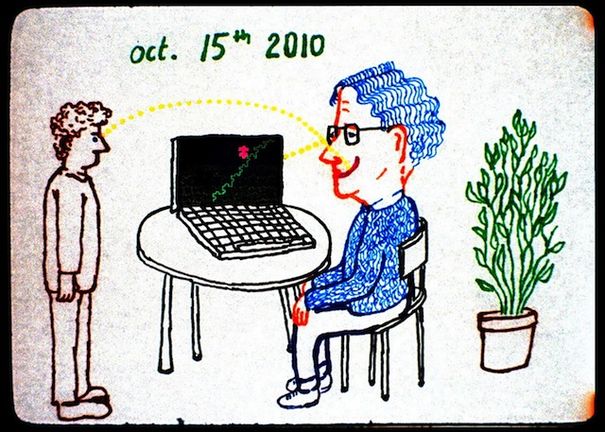Noam's Arch
Christina Newland of the Talent Press 2014 reviews Michel Gondry's new documentary essay about Noam Chomsky.

Michel Gondry's animated documentary IS THE MAN WHO IS TALL HAPPY?
Acclaimed French director Michel Gondry’s latest project may seem like a minor one, yet it is a significant primer on cultural and linguistic theory. His “animated conversation”, IS THE MAN WHO IS TALL HAPPY? (Berlinale Panorama), is the genesis of a series of filmed interviews with esteemed linguist, scientist, and political activist Noam Chomsky. What appear to be the antithetical qualities of the two men make for strangely fertile intellectual territory; Gondry's dreamy, self-deprecating sensibility chafes against Chomsky's deeply rational perspective. Gondry illustrates the conversation with hand-drawn, child-like animations, as the philosopher expounds on topics ranging across cognitive science, the birth of language and the tribalism of society. Rudimentary drawings are juxtaposed against faded photographs, offering up madcap conceptual diagrams that waver between crudely-drawn and insightful. It may be knowingly facile, but such simplicity offers both counterpoint and explanatory companion to Chomsky's academic rigor.
Gondry takes the role of fumbling narrator, interjecting often with confessional thoughts and digressions – self-indulgence is rife. Yet he manages to bring a light touch and novel approach to the conversation, creating a satisfyingly jarring dynamic. The language barrier (with a prominent linguist, none the less) provides a few laughs, with Gondry struggling to pronounce “endowment“ and Chomsky, holding forth on science fiction, going blank and needing to be prompted on the word “teleportation“. It must be said that the film's great success is in having Chomsky as its subject. He is perennially fascinating, and sometimes dauntingly inscrutable. Gondry attempts to mine into his formative years; growing up Jewish in America during the Second World War, his child-rearing practices; even inquiring about what “makes him happy”. It seems clear Chomsky's not used to fielding such personal questions. He is tentative, particularly when asked about happiness. He chooses to share what he finds “gratifying“ instead – a tellingly solemn response. The film’s lively, visual sense serves to demonstrate Chomsky's intellectual argument, but also reveals the personal shaping of one of the world’s foremost thinkers. The result is a playful, impressionistic display of two divergent minds at work.

